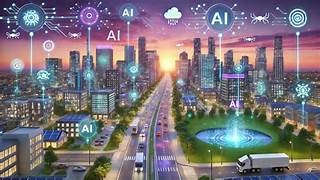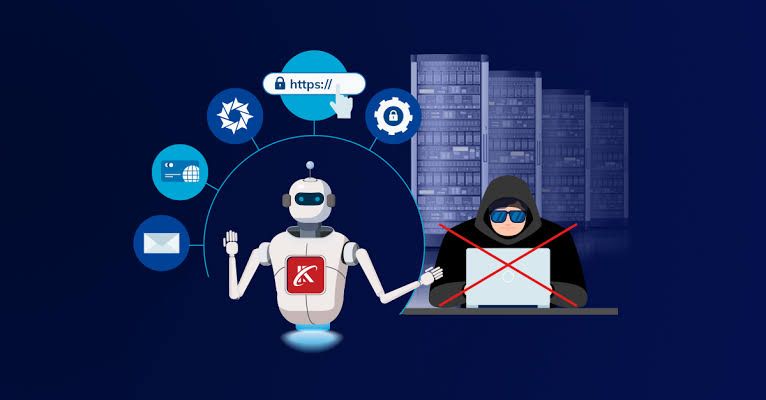
Quantum Computing: The Next Internet Revolution?
Quantum computing is more than faster machines—it’s a radical shift in how we process information. Harnessing superposition and entanglement, it promises breakthroughs in cryptography, healthcare, AI, finance, and climate science. Like the internet once did, it could redefine society, economies, and global power. The revolution has begun, but its full impact is yet to come.
✨ Raghav Jain

Quantum Computing: The Next Internet Revolution?
The history of technological progress is filled with milestones that reshaped humanity— the printing press, the steam engine, electricity, telecommunication, the computer, and the internet. Each one triggered a wave of transformation that went far beyond its immediate application. Today, many experts argue that quantum computing could be the next such disruptive leap, comparable in scope to the internet revolution. But what exactly is quantum computing, why is it seen as so transformative, and what are its real-world implications for our future?
The Foundation: What is Quantum Computing?
At its core, quantum computing is not just about faster computers—it is about a fundamentally different way of processing information. Classical computers, no matter how advanced, operate using bits—binary digits that represent either a 0 or a 1. Quantum computers, however, use qubits (quantum bits), which can represent both 0 and 1 simultaneously thanks to a property called superposition.
Furthermore, quantum computers exploit entanglement, a quantum phenomenon where particles become interlinked in such a way that the state of one instantly influences the other, regardless of distance. These properties enable quantum computers to process enormous amounts of information in parallel, solving problems that would take classical supercomputers centuries—or even longer—to tackle.
This is why many call quantum computing the next internet revolution: not because it will replace today’s computers, but because it will create entirely new industries, reshape global security, and redefine what is possible in science and technology.
From Theory to Reality: A Brief History of Quantum Computing
The concept of quantum computing emerged in the early 1980s, when physicist Richard Feynman suggested that classical computers struggled to simulate quantum systems. His insight was simple but powerful: only a machine built on quantum principles could efficiently model quantum behavior.
Key milestones include:
- 1981: Richard Feynman and Yuri Manin propose the idea of quantum computers.
- 1994: Peter Shor develops Shor’s Algorithm, showing that quantum computers could factorize large numbers exponentially faster than classical computers—a direct threat to modern cryptography.
- 2001: IBM demonstrates the first implementation of Shor’s algorithm on a 7-qubit machine.
- 2019: Google claims “quantum supremacy” when its quantum processor Sycamore performed a computation in 200 seconds that would take a classical supercomputer 10,000 years.
Today, companies like IBM, Google, Microsoft, Rigetti, and D-Wave, along with startups and governments worldwide, are racing to build practical quantum systems.
Why Quantum Computing is Seen as the Next Revolution
1. Breaking Cryptography and Redefining Cybersecurity
Modern internet security relies on encryption methods like RSA, which are based on the difficulty of factoring huge numbers. Classical computers cannot solve these problems in reasonable timeframes. However, quantum computers running Shor’s algorithm could crack such codes within hours or minutes.
This means that the entire global cybersecurity infrastructure could be rendered obsolete once quantum computers reach maturity. On the flip side, it also opens the door to quantum cryptography, such as quantum key distribution (QKD), which promises theoretically unbreakable encryption.
2. Transforming Medicine and Drug Discovery
Designing drugs requires simulating complex molecules and their interactions—an almost impossible task for classical computers due to the astronomical number of possible molecular configurations. Quantum computers, however, can simulate quantum systems directly. This could lead to breakthroughs in curing diseases, designing personalized medicine, and even fighting pandemics faster than ever before.
3. Revolutionizing Artificial Intelligence (AI)
AI depends on processing massive amounts of data and optimizing algorithms. Quantum computing could supercharge machine learning models, enabling faster training, more accurate predictions, and entirely new capabilities. For instance, quantum-enhanced AI could drive advances in autonomous vehicles, financial forecasting, and climate modeling.
4. Optimization at Scale
Many industries—from logistics and finance to energy—depend on solving optimization problems (e.g., how to deliver goods with minimum cost and time). Quantum computers can tackle these far more efficiently, saving billions of dollars annually and enabling previously impossible solutions.
5. Scientific Discovery and Climate Change
Quantum simulations could accelerate discoveries in physics, chemistry, and materials science. Imagine designing better batteries for electric cars, developing ultra-efficient solar panels, or creating new superconductors. These advances could directly contribute to combating climate change and advancing sustainable technologies.
Challenges and Roadblocks
While the potential is vast, quantum computing is not ready for mass adoption. Several challenges remain:
- Error Rates and Decoherence: Quantum systems are extremely fragile. The slightest interference (like heat or vibration) can collapse qubits, leading to errors.
- Scaling Up: Building machines with millions of stable qubits is a massive engineering challenge. Current devices only have tens or hundreds of qubits.
- Cost: Quantum computers require specialized environments, often cooled near absolute zero. This makes them extremely expensive to build and maintain.
- Software Ecosystem: Programming a quantum computer is vastly different from writing code for classical computers. Developers need new tools, languages, and frameworks.
- Security Risks: The transition to quantum-safe cryptography must happen before quantum computers break existing encryption.
Quantum Computing vs. the Internet Revolution
The internet changed communication, commerce, education, and culture. Quantum computing, while less visible to the average person, could trigger an even deeper transformation by reshaping industries at their core.
- The Internet democratized information.
- Quantum Computing could democratize power—the power to solve problems previously thought unsolvable.
Just as the internet gave birth to companies like Google, Amazon, and Facebook, quantum computing could give rise to new giants in healthcare, finance, and security.
Global Race for Quantum Supremacy
Nations see quantum technology as a matter of national security. The U.S., China, the European Union, and India are heavily investing in quantum research. China, for example, has already demonstrated satellite-based quantum key distribution. The country or company that leads in quantum computing could dominate geopolitics, much as the U.S. dominated the digital age with Silicon Valley.
The Road Ahead
Experts estimate that practical, large-scale quantum computers could arrive within the next 10 to 20 years, though small-scale quantum systems are already being deployed for specific problems.
What we are witnessing now is akin to the early internet era of the 1980s: bulky, expensive, and experimental—but with revolutionary potential waiting to be unleashed. The internet needed decades of infrastructure, protocols, and widespread adoption before it transformed the world. Quantum computing is likely on a similar trajectory.
Quantum computing has emerged as one of the most transformative technological frontiers of the 21st century, often described as a potential revolution on par with or even greater than the rise of the internet, because while the internet democratized information, quantum computing promises to democratize the ability to solve problems once thought impossible, redefining industries and reshaping human progress; unlike classical computers, which rely on bits that store data as either 0 or 1, quantum computers use qubits, which can exist in multiple states simultaneously thanks to quantum properties like superposition and entanglement, enabling them to process vast amounts of data in parallel, and this is why scientists and technologists believe quantum computers could solve problems in seconds that would take classical supercomputers thousands of years, with implications that touch nearly every aspect of human life, from cybersecurity and healthcare to artificial intelligence, finance, logistics, climate science, and beyond; the concept of quantum computing was first articulated in the early 1980s by physicist Richard Feynman, who realized that simulating quantum systems was nearly impossible on traditional computers, and the breakthrough moment came in 1994 when Peter Shor devised an algorithm showing that quantum computers could factorize large numbers exponentially faster than classical ones, instantly posing a threat to global cryptography systems, because nearly all modern encryption, including RSA, depends on the assumption that such factorization takes too long for classical machines to compute, but on a sufficiently advanced quantum computer, these codes could be broken in minutes, putting banking, military, and governmental data at risk, and while this poses a massive challenge to cybersecurity, it also opens a new era of quantum-safe encryption, such as quantum key distribution (QKD), which uses the laws of physics rather than mathematical complexity to create unbreakable codes, meaning quantum computing is not just a risk but also a potential solution to the very problems it introduces; beyond cryptography, the potential applications are breathtaking—drug discovery, for example, relies on simulating complex molecular interactions that classical machines cannot handle due to the sheer number of possibilities, but quantum computers can directly model molecules at the quantum level, which could lead to cures for previously untreatable diseases, personalized medicine, and rapid pandemic response, while in the realm of artificial intelligence, quantum-enhanced machine learning algorithms could accelerate training speeds, process enormous datasets with greater accuracy, and push forward innovations in autonomous vehicles, natural language processing, and predictive analytics, essentially creating AI that learns, adapts, and evolves at a pace far beyond today’s capabilities; optimization problems, which affect industries ranging from airlines planning efficient flight routes to financial firms balancing investment portfolios, are another quantum stronghold, because while classical computers struggle with exponential complexity, quantum systems can explore countless combinations simultaneously, offering solutions that save time, money, and resources, and in climate science, quantum simulations could enable the design of new materials for cleaner energy, efficient batteries, or even room-temperature superconductors, radically changing energy storage and distribution, which in turn could accelerate the global shift to sustainability; yet despite the hype, the path to practical quantum computers is riddled with challenges, the foremost being decoherence, which refers to the fragility of qubits that lose their quantum state due to environmental noise like heat, light, or vibration, leading to high error rates, and while scientists are working on error-correction methods and more stable qubit architectures, building a system with millions of reliable qubits remains an engineering hurdle, with today’s machines operating on only tens or hundreds of qubits, moreover, these systems are enormously expensive, often requiring cryogenic cooling near absolute zero, vacuum chambers, and highly specialized environments, making them accessible only to large corporations, research labs, or governments; another challenge is the lack of a mature software ecosystem, because programming a quantum computer is vastly different from traditional coding, requiring new languages, algorithms, and frameworks, meaning that for quantum computing to truly revolutionize industries, a generation of quantum programmers and hybrid systems (where classical and quantum machines work together) must evolve; nonetheless, progress has been rapid—Google claimed “quantum supremacy” in 2019 when its processor Sycamore solved a problem in 200 seconds that would take a classical supercomputer 10,000 years, IBM has developed publicly accessible quantum machines via its IBM Quantum Experience, and startups like Rigetti, IonQ, and D-Wave are pushing boundaries, while nations are racing to achieve quantum dominance, with the United States, China, and Europe investing billions of dollars, because just as the country that dominated the internet economy wielded disproportionate influence in the 21st century, the nation that leads in quantum computing could dominate geopolitics, finance, and even warfare in the coming decades, and China has already shown its ambition with experiments in quantum satellite communication, raising concerns of a new “quantum arms race”; in comparing quantum computing to the internet revolution, it is worth remembering that the internet in its early stages of the 1980s and 1990s was slow, expensive, and limited to researchers, yet its infrastructure and ecosystem matured into the backbone of global life, and similarly, quantum computing today is in its infancy but could evolve into a foundation for a new technological era, not one that replaces classical computing but one that complements it by tackling specialized tasks, leaving everyday computing to conventional machines; the ultimate question is whether quantum computing is truly the next internet revolution, and the answer, though complex, leans strongly toward yes, because while the average consumer may not directly interact with a quantum device in the way they use a smartphone or web browser, the ripple effects of quantum breakthroughs will touch their lives indirectly through better healthcare, stronger security, smarter AI, cleaner energy, and more efficient industries, and just as most internet users today don’t understand TCP/IP protocols or server architecture but still benefit from them, tomorrow’s world may run on quantum foundations that are invisible yet indispensable; in conclusion, quantum computing represents not just a technological leap but a paradigm shift, one that carries risks and challenges but also the promise of solving humanity’s most pressing problems, and if the internet was the revolution that connected humanity, quantum computing may be the revolution that empowers humanity to solve what once seemed unsolvable.
Quantum computing is increasingly being hailed as the next great technological revolution, often compared to or even projected to surpass the internet in terms of long-term impact, because while the internet democratized access to information and reshaped communication, commerce, and culture, quantum computing promises to fundamentally redefine humanity’s ability to solve problems that are currently impossible for classical machines, offering capabilities that could transform industries ranging from cybersecurity and healthcare to artificial intelligence, finance, logistics, climate science, and national security, and at its heart quantum computing is not about making existing computers faster but about a completely different way of processing information, since traditional computers rely on bits that store data as 0 or 1, while quantum computers use qubits that, thanks to the strange properties of quantum mechanics such as superposition and entanglement, can exist as 0 and 1 simultaneously and even influence each other instantly across distance, thereby allowing these systems to explore countless possible solutions in parallel rather than sequentially, meaning that tasks which would take even the world’s most powerful supercomputers thousands or millions of years could in theory be solved by a sufficiently advanced quantum processor in minutes or seconds, a concept that first took shape in the early 1980s when physicist Richard Feynman observed that simulating quantum systems was impractical on classical computers and concluded that only a machine based on quantum principles could handle such complexity, leading to the birth of quantum computing as a field, with a critical breakthrough coming in 1994 when mathematician Peter Shor developed an algorithm showing that quantum computers could factorize large numbers exponentially faster than classical ones, posing an immediate and profound challenge to cybersecurity because nearly all modern encryption systems, such as RSA, depend on the fact that classical computers cannot efficiently factorize massive numbers, but if quantum computers can, the foundations of global digital security would collapse, putting banking, government, military, and personal data at risk, and this is why governments and corporations are already investing heavily in quantum-safe cryptography such as quantum key distribution, which uses the laws of physics to create codes that cannot be intercepted or cracked, making quantum computing simultaneously the greatest threat and the greatest savior of information security, and beyond cryptography its transformative potential extends to drug discovery, where the ability to model molecular interactions at a quantum level could lead to cures for diseases like cancer or Alzheimer’s, new antibiotics for resistant bacteria, and even rapid vaccine development in the face of pandemics, while in artificial intelligence quantum-enhanced machine learning could speed up training times, allow algorithms to sift through massive datasets with greater efficiency, and create smarter, more adaptive systems, potentially pushing AI into realms we can hardly imagine today, from autonomous vehicles and robotics to real-time financial forecasting and advanced medical diagnostics, and optimization problems in industries such as supply chain management, airline scheduling, or energy distribution, which classical computers struggle with due to exponential complexity, could be solved almost instantly, saving billions in costs and resources, while in materials science and climate research quantum simulations could lead to revolutionary breakthroughs such as room-temperature superconductors, vastly more efficient batteries, new lightweight materials for aerospace, or highly efficient solar panels, all of which could accelerate humanity’s transition toward sustainability and clean energy, yet despite this enormous promise the field is still in its infancy and faces daunting challenges, most notably qubit instability and error rates caused by decoherence, the tendency of quantum states to collapse under environmental noise like heat, light, or vibration, which makes calculations unreliable, and while scientists are developing quantum error correction and experimenting with more stable qubit designs, from superconducting circuits to trapped ions and photonic systems, scaling up to machines with millions of error-corrected qubits remains a monumental task, given that today’s devices typically operate with only tens or hundreds, and furthermore these machines require extreme conditions such as cooling near absolute zero or highly controlled environments, making them prohibitively expensive and accessible only to a handful of labs and corporations, and even if the hardware challenge is overcome, there is also the issue of the software ecosystem, since quantum programming requires entirely new languages, algorithms, and frameworks, meaning a whole new generation of developers must be trained to bridge classical and quantum approaches, and yet progress has been steady, with milestones such as Google’s 2019 claim of achieving “quantum supremacy” when its Sycamore processor performed a calculation in 200 seconds that would take a classical supercomputer thousands of years, IBM offering cloud-based access to quantum machines for researchers worldwide, and startups like IonQ, Rigetti, and D-Wave pushing commercial applications, while governments are pouring billions into research, with the United States, China, Europe, and India all prioritizing quantum technology as a matter of national security, because whoever achieves practical quantum advantage first could dominate geopolitics, finance, and defense much like the United States dominated the digital age with Silicon Valley, and China has already demonstrated quantum satellite communication, sparking fears of a new arms race, so in comparing quantum computing to the internet revolution it is clear that we are still in the early days, much like the internet of the 1980s when it was limited, expensive, and used only by academics, but just as the internet eventually matured into the backbone of modern life, quantum computing is likely to evolve into a foundational layer of science and industry, not replacing classical computers but complementing them by handling specialized tasks beyond classical reach, and while the average person may never interact directly with a quantum processor, its impact will be felt in invisible yet profound ways, from stronger encryption and smarter AI to better medicine and cleaner energy, and so the question of whether quantum computing will be the next internet revolution can be answered with cautious optimism: yes, it has the potential to be even more transformative, but the timeline will likely span decades as challenges are resolved, ecosystems built, and applications scaled, and when that happens, quantum computing may stand as the revolution that did not merely connect humanity, as the internet did, but one that empowered humanity to solve its deepest and most complex problems once thought unsolvable.
Conclusion
Quantum computing is not merely an upgrade to current systems—it represents a paradigm shift in computing. By harnessing quantum mechanics, these machines could crack codes, design new drugs, optimize industries, revolutionize AI, and tackle climate change.
However, challenges such as scalability, error correction, and cost remain significant. The global race for quantum supremacy mirrors the space race of the 20th century, with nations and companies striving for dominance.
Will quantum computing be the next internet revolution? The answer is yes—but not immediately. Just as the internet took decades to reshape society, quantum computing will take time. But when it arrives at full scale, its impact could be even more profound, affecting not just how we connect, but how we solve the greatest challenges facing humanity.
Q&A Section
Q1: What makes quantum computing different from classical computing?
Ans: Classical computers use bits (0 or 1), while quantum computers use qubits, which can exist in multiple states simultaneously due to superposition and entanglement. This allows quantum computers to process vast amounts of information in parallel.
Q2: Why is quantum computing considered a threat to current cybersecurity?
Ans: Quantum algorithms like Shor’s can break widely used encryption systems such as RSA, which currently secure internet transactions, banking, and communications.
Q3: What industries will benefit the most from quantum computing?
Ans: Healthcare (drug discovery), finance (portfolio optimization), logistics (supply chain efficiency), energy (battery design), and AI (machine learning acceleration) are expected to see the greatest benefits.
Q4: How soon will we see practical quantum computers?
Ans: Experts predict 10–20 years for fully scalable systems, though specialized quantum devices are already being tested for niche applications.
Q5: Will quantum computing replace classical computers?
Ans: No. Quantum computers will complement classical systems, excelling in specific tasks (like cryptography, simulation, and optimization) while classical computers remain more efficient for general-purpose tasks.
Similar Articles
Find more relatable content in similar Articles

Smart Cities: How Technology I..
Smart cities are transforming .. Read More

Solar-Powered Wearables: Can T..
Solar-powered wearables are re.. Read More

AI-Powered Hackers: The New Cy..
In 2025, cyber threats have en.. Read More

AI in Drug Discovery: Faster C..
Artificial Intelligence is rev.. Read More
Explore Other Categories
Explore many different categories of articles ranging from Gadgets to Security
Smart Devices, Gear & Innovations
Discover in-depth reviews, hands-on experiences, and expert insights on the newest gadgets—from smartphones to smartwatches, headphones, wearables, and everything in between. Stay ahead with the latest in tech gear
Apps That Power Your World
Explore essential mobile and desktop applications across all platforms. From productivity boosters to creative tools, we cover updates, recommendations, and how-tos to make your digital life easier and more efficient.
Tomorrow's Technology, Today's Insights
Dive into the world of emerging technologies, AI breakthroughs, space tech, robotics, and innovations shaping the future. Stay informed on what's next in the evolution of science and technology.
Protecting You in a Digital Age
Learn how to secure your data, protect your privacy, and understand the latest in online threats. We break down complex cybersecurity topics into practical advice for everyday users and professionals alike.
© 2025 Copyrights by rTechnology. All Rights Reserved.